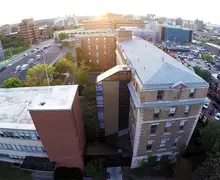Educator trained in discredited communication method at SU pleads guilty to criminal sexual contact
Daily Orange File Photo
The Institute on Communication and Inclusion, housed in SU's School of Education, held workshops on the discredited communication method this week.
Anna Stubblefield, a former professor at Rutgers University who received training from Syracuse University, pleaded guilty Monday to a charge of criminal sexual contact with a man who has cerebral palsy, according to media reports.
Stubblefield had previously maintained that she received consent from the man by communicating with him using facilitated communication, a scientifically discredited communication method that originated at SU and has since expanded to other parts of the country.
Advocates of facilitated communication say it allows people who are nonverbal to communicate by typing out words on a device, such as a keyboard, with assistance from an aid. But scientific testing has strongly indicated that, through a phenomenon similar to the “Ouija board” effect, aids unknowingly control the words that are typed.
Douglas Biklen, the former dean of SU’s School of Education, learned of the method in the late 1980s from an educator in Australia. He then brought the method to SU and ultimately established the Facilitated Communication Institute, now called the Institute on Communication and Inclusion. The institute still practices and promotes facilitated communication, now sometimes referred to as “supported typing.”
Stubblefield was certified as a facilitated communication aid from the institute in 2008. The institute instructs aids to “presume competence” in the individuals who are nonverbal, rather than testing whether they can communicate.
Stubblefield now admits to having criminal sexual contact with a man, referred to as “D.J.” in court proceedings, after previously believing he consented to the interaction using facilitated communication.
As she reached a plea deal Monday, Stubblefield acknowledged that the man was not legally able to consent. She was previously found guilty in 2015 on two counts of first-degree aggravated sexual assault before being granted a retrial last year.
James Todd, a vocal critic of facilitated communication and a professor at Eastern Michigan University who researches pseudoscientific interventions for autism, said SU made a “significant contribution to this tragedy.”
“For decades, the Syracuse administration has not only tolerated dangerous facilitated communication pseudoscience, it has even openly championed FC over clear and established science,” he said. “… It is not too late. Syracuse University can still renounce and repudiate FC. It can take real responsibility for all the harm left in its wake. No voice would speak louder than Syracuse’s on this issue.”

Daily Orange File Graphic
The ICI is currently directed by Christine Ashby, an associate professor at the School of Education whose time at the school overlapped with Biklen. Neither SU officials nor Ashby returned requests for comment Monday evening.
The institute has lived on through the years despite criticism from the academic and scientific communities.
One well-publicized empirical testing of facilitated communication occurred in 1992 about 130 miles from Syracuse University — at the Oswald D. Heck Developmental Center in Schenectady.
Twelve individuals who were nonverbal, living at the center and using facilitated communication, participated in the study along with aids. The study consisted of the 12 individuals and their aids being shown pictures of everyday objects. They were then asked to type the name of the objects. The findings indicated the aids controlled the words that were typed.
When the aids and individuals were shown the same picture, 10 of the 12 individuals were able to produce correct answers. But when the aids and the individuals were shown pictures of different objects, the only “correct” answers were the names of the objects shown to the aids — never of the objects shown to the individuals who were nonverbal.
Similarly-modeled double-blind testing and other empirical studies have since resulted in conclusions similar to that study.
For decades, the Syracuse administration has not only tolerated dangerous facilitated communication pseudoscience, it has even openly championed FC over clear and established science.James Todd, Professor at Eastern Michigan University
When Biklen became dean of the School of Education in 2005, the Commission for Scientific Medicine and Mental Health issued a statement expressing concern over the appointment, noting his support of facilitated communication.
“(Syracuse University’s) appointment of Dr. Biklen as Dean is a major step backward in the vitally important effort to promote science and combat pseudoscience in mental-health care,” read the statement, which was signed by professors from dozens of universities.
Janyce Boynton, a former aid in facilitated communication who now agrees with academics who call it a pseudoscience, described to The Daily Orange in 2016 how she controlled words that were typed through individuals who were nonverbal — all without realizing she was in control.
“When you’re facilitating, you’re so distracted by other things. You’re carrying on conversations, you’re asking and answering questions, you’re trying to look at the person to see if they’re looking at the keyboard,” she said. “Your brain is so engaged that you lose sight of what’s happening with your hand. … It actually goes away rather quickly. And that’s what makes it feel like it’s working because the more you practice it, the more the movements feel really fluid.”
As Stubblefield pleaded guilty Monday, SU’s Institute on Communication and Inclusion was holding the first of a two-day workshop on facilitated communication. Participants in the workshop are required to pay $125.
Stubblefield’s will be sentenced May 7, according to NJ.com.
Published on March 19, 2018 at 11:23 pm
Contact Michael: [email protected]


